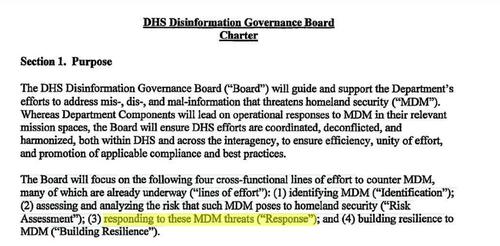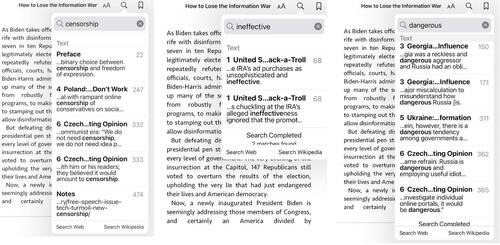Authored by Matt Taibbi via Racket News (subscribe here),
Nina Jankowicz, who was to have run the now “paused” project of the Department of Homeland Security called the Disinformation Governance Board, is suing Fox News. Since I do not want to be sued by Nina Jankowicz, this article will be built around direct quotes of official sources, and her own writings and statements.

First, from the complaint, a list of insults, not to be read for amusement:
By turns, Fox described Jankowicz as moronic, an embarrassment to her parents and employers, and a “self-obsessed social media neophyte.” Hosts and commentators referred to Jankowicz as, inter alia, “low I.Q,” “illiterate,” “Miss TikTok meets America’s Got No Talent,” “disinfo overlord,” “disinformation czaress,” “minister of truth,” “Scary Poppins,” a “useful idiot,” “janko-half-witz,” a “lunatic,” and “the wicked witch.”
In case you were unable to grasp that text clearly, here is an audio version, read by a machine with a pleasant British accent:
If you’re still left wanting, here is my video interpretation of the text, read with a mouthful of jellybeans:
Further down, the complaint read:
The story Fox fabricated about Jankowicz sprang from the creation of a government entity—the Disinformation Governance Board (the “Board”)— nested in the Department of Homeland Security (“DHS”), and from Jankowicz’s appointment as the Board’s Executive Director. But the Board was an internal working group with no operating authority or capability. The Board had no ability to intervene, respond to, or prevent the spread of disinformation…
On June 7, 2022, Senators Chuck Grassley of Iowa and Josh Hawley of Missouri sent a letter to Homeland Security Secretary Alejandro Mayorkas, requesting information about the Disinformation Governance Board. As a result of that letter, the charter of the DGB was made public.
With both the complaint and the charter in hand, we can compare some statements:
From the complaint:
The Board had no ability to intervene, respond to, or prevent the spread of disinformation.
From the DGB Charter:
The Board will focus on… (3) responding to these MDM threats (“Response”)

From the complaint:
[The Board] had nothing to do with “governing disinformation” outside of the Department.
So, the “Disinformation Governance Board” had nothing to do with “governing disinformation.”
Outside of the Department, that is. Does that mean it would have been concerned with governing disinformation inside the Department?
Confusing. Perhaps the Charter sheds light:
The Board will serve as the departmental forum for governance of DHS policies, plans, procedures, standards, and activities pertaining to MDM that threatens homeland security.
Lastly, the complaint reads:
Any amount of investigation would have revealed that Jankowicz’s published writings avow that even in the context of a disinformation war, she believes censorship is ineffective and dangerous. In her book, How to Lose the Information War, Jankowicz explicitly makes that point, which is echoed and attributed to her in a Wilson Center policy paper, readily accessible online.
It is true that Jankowicz wrote a paper that is highly critical of counter-disinformation efforts in Singapore (she calls the Protection from Online Falsehoods and Manipulation Act or POFMA a “cover for censorship”) and in Ukraine (where a draft Law on Disinformation had “unclear guidelines” that pose a “threat to freedom of expression”).
However, she was not so down on Germany’s “Act to Improve Enforcement of the Law in Social Networks” or “NetzDG” law, which forces social media companies to remove large quantities of material under a Code of Conduct that previously had been voluntary. This extremely ambitious law “obliges large social media companies… to enforce 21 statutes in the German Criminal Code related to hate speech in the online spaces they manage and delete any illegal content.”
What does the person who believes “censorship is ineffective and dangerous” say about a German law that requires private companies to “manage and delete” content in accordance with 21 different statutes?
NetzDG is a fundamentally imperfect law, but Germany’s robust protections for political rights and civil liberties equip the country to mitigate its adverse domestic effects. However, implementation of laws similar to NetzDG in states with fewer protections could result in severe consequences for users’ digital rights.
In other words, NetzDG is imperfect, but its imperfections are tolerable in a country like Germany. Are we such a country? I looked for an answer both in the paper, and in her book.
I was not able to find a passage in Jankowicz’s How to Lose the Information War describing censorship as ineffective and dangerous. Possibly it’s in there in spirit, just not using any of the terms ineffective, dangerous, or even censorship:

In the absence of that discovery, I did find two passages that may be pertinent.
Read the rest here…
Loading…
https://www.zerohedge.com/political/taibbi-fact-check-nina-jankowicz-v-fox-news






